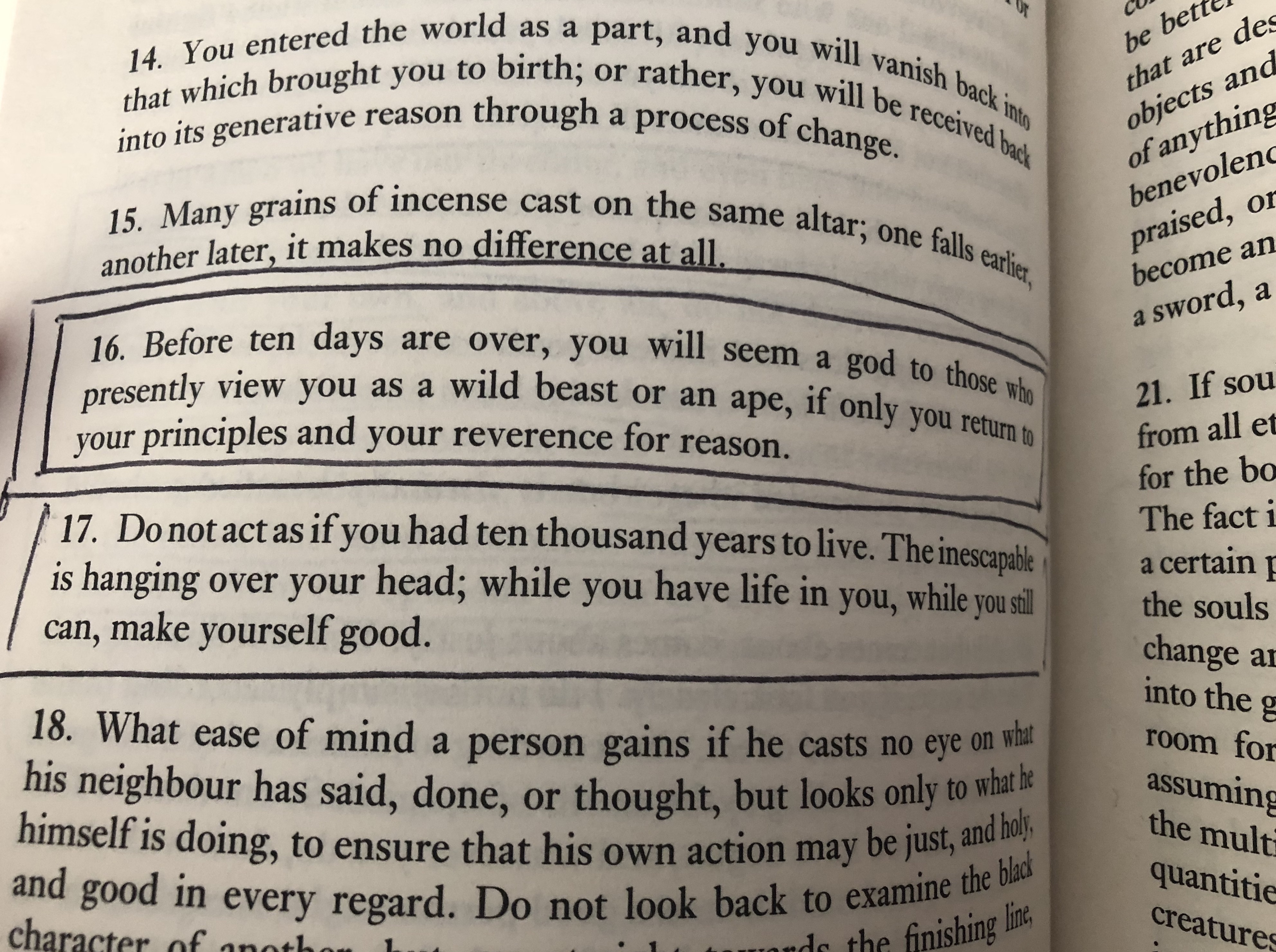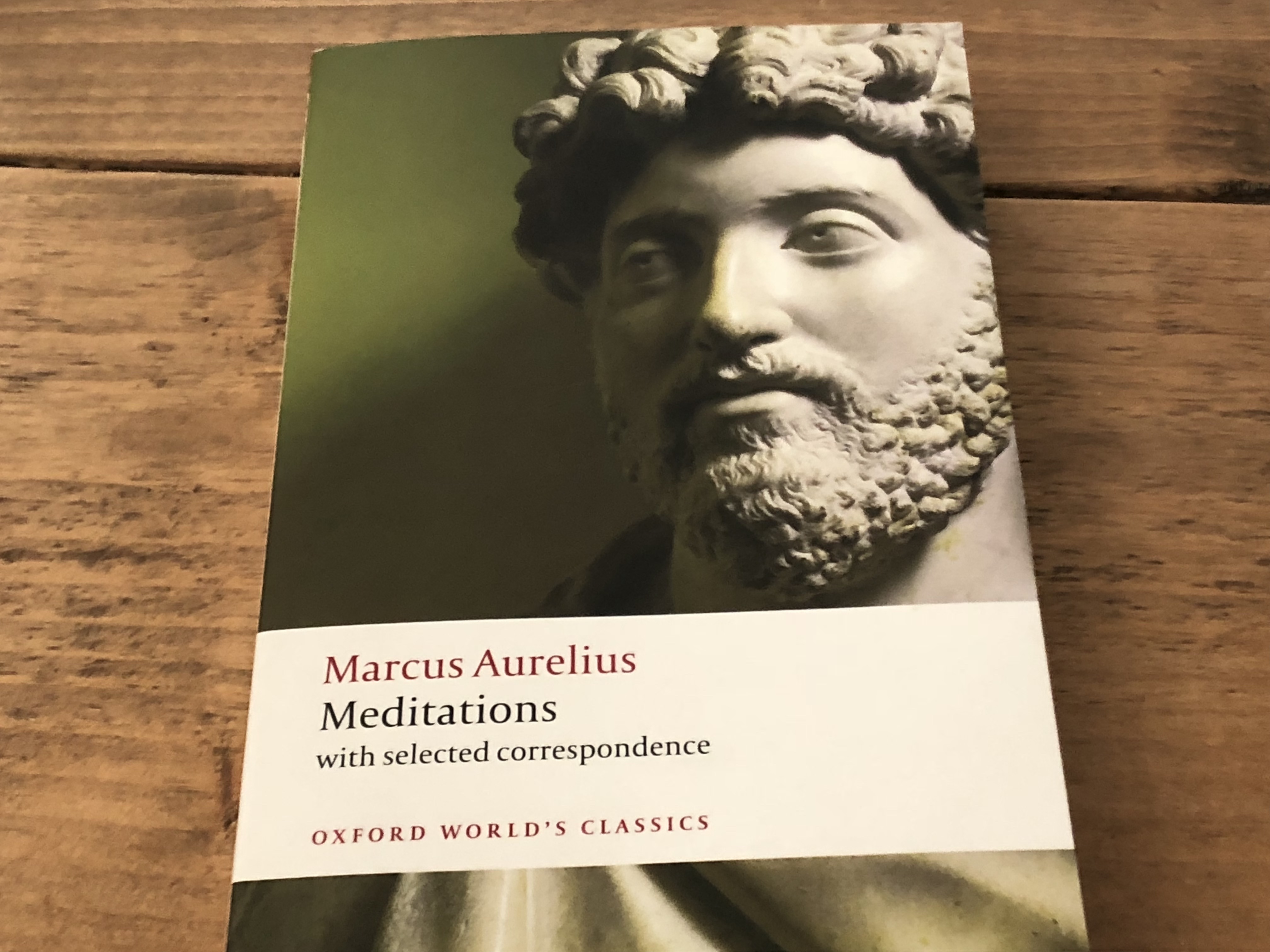Before ten days are over, you will seem a god to those who presently view you as a wild beast or an ape, if only you return to your principles and your reverence for reason. (4.16)
This is the most profound precept in all of the Meditations.
Profound in your intuitive ability to know it’s truth. Profound also in its difficulty to apply.
This precept contains everything already laid out in the previous books as conscious knowledge and is telling you now to apply it.
I’ve seen the transformation with people in my life. People who, if we’re putting it unkindly, were viewed as “beast” and within no time at all (a couple of weeks) were viewed as though a “god” because they abandoned their old reckless ways and adopted a new life.
This is a hypothetical that fills me with excitement and dread.
If one really were able to adhere 100% to their principles and reason, ten days would be enough time for people in your life to change their opinion of you. Mostly this is due to how short people’s attention spans are, but it’s also due to how dramatic a change it would be if you could live completely faithfully to your principles.
The fear comes in this:
It sounds like a challenge.
No doubt Aurelius was issuing a challenge to himself. But everyone loves a challenge. Do you think you could take on this one and win?
- Do you even know what your principles are?
- Have you given enough consideration and practice to your powers of reason?
- Could you live ten days like this starting from today?
Do not act as if you had ten thousand years to live. The inescapable is hanging over your head; while you have life in you, while you still can, make yourself good. (4.17)
We act as though we had ten thousand years to live. Maybe not Elon Musk. Or Bill Gates. But when you give rise to impulses that cause you to squander time and energy aimlessly, you are acting as if this life supply will never run out.
I’ll pop another Percocet. I want to feel good now. I don’t want to deal with today today. Tomorrow will be better if I just get high now.
I’ll raise my voice and allow another person to bait me to anger. I’ll put too much stock in my shallow ego and allow myself to be wounded now. After all, I’m still alive. I’m not going to die tomorrow.
I’ll have sex whenever and with whoever I want. Doesn’t matter that the prospect of actually getting this person pregnant fills me with dread. Doesn’t matter that I don’t know them or trust them. I want to feel good now. I don’t want to use this energy for the common good or even my own good. I want to drain myself.
We do these things BECAUSE “the inescapable” is hanging over our heads.
We delude ourselves into thinking we have much longer than we really do.
Right now you have life in you.
The time to make yourself good is now.
The questions I really want the answers to are these:
- Why do we procrastinate on making ourselves good?
- What is it we fear will happen if we abandon our harmful ways and do what we know is right?
Never embark on an action at random, or otherwise than according to one of the principles that perfect the art of living. (4.2)
We should all think of our lives as a work of art.
Not in the tragic Tristan und Isolde sense of art.
We’re not talking a toilet turned on its side, signed, and mounted in a gallery.
We’re talking about carving our life and our character out of stone.
We do that through considered living.
Nothing is random.
Every action we take, every thought we allow space, is according to the principles that “perfect that art of living”.
Stoicism as a philosophy is easy to understand.
Stoicism as a way of life is incredibly difficult.
Do you know your principles?
If you know some of them, can you apply them consistently? Have you applied them or trespassed against them today?
Is your life a random string of events, a random succession of actions in which you feel as though you had no true control? Or is everything considered?
What are you doing today to perfect the art of living?
Did you place your chisel against the rock with precision and chip away a small yet perfect piece of granite, revealing one more inch of the grandeur that lies beneath?
Or did that chisel lay unused, neglected, ignored on the workbench while you masturbated and played Angry Birds?
People seek retreats for themselves in the countryside, by the seashore, in the hills; and you too have made it your habit to long for that above all else. But this is altogether unphilosophical, when it is possible for you to retreat into yourself whenever you please; for nowhere can one retreat into greater peace or freedom from care than within one’s own soul, especially when a person has such things within him that he has merely to look at them to recover from that moment perfect ease of mind (and by ease of mind I mean nothing other than having one’s mind in good order). So constantly grant yourself this retreat and so renew yourself; but keep within you concise and basic precepts that will be enough, at first encounter, to cleanse you from all distress and to send you back without discontent to the life to which you will return. […]
So in the future, remember to retreat into this little plot of earth that is truly your own, and above all, do not distress or overstrain yourself, but preserve your freedom, and look at things as a man, a human being, a citizen, a mortal creature. And among the precepts which you keep most closely at hand for frequent reference, let the following be included: firstly, that things of themselves have no hold on the mind, but stand motionless outside it, and all disturbances arise solely from the opinions within us; and secondly, that all you presently behold will change in no time whatever and cease to exist; and constantly reflect on how many such changes you yourself have already witnessed. (4.3)
You can’t escape yourself.
You can’t run from your life or the reality you’ve created.
As Ayn Rand says: “You can avoid reality, but you cannot avoid the consequences of avoiding reality.”
Why do we wait for these small snatches of time (that never come) in order to allow ourselves retreat?
A holiday one or two weeks out of the working year…
A Sunday afternoon after dinner…
And when we do snatch that time, the retreat is rarely as reviving as it ought to be.
We’re still fleeing something.
- Why don’t we choose to retreat into ourselves more often?
- How can we exercise our power to go inwards in a way that is healthy and life-affirming?
What I love about this part of Aurelius’ notes is the fact that he hits on this idea of confronting that which you run from.
Peace is yours, he says, if only you look at the thing that terrifies you right in the face.
You can’t solve a problem by ignoring it. It only grows bigger. But to actually grab the devil that plagues you by the horns and look it in the eyes it immediately shrinks in size and you can sigh a sigh of relief.
Aurelius instructs himself and us to constantly grant ourselves this retreat and renew oneself.
I love the reframing here.
You have a problem, one that plagues you, but looking it in the face and dealing with it by going inwards, becoming more introspective, is a retreat.
It’s a renewal.
Facing your problems head on is how you exfoliate your soul.
Two lessons are continually hammered in Aurelius’ Meditations:
- Externals can’t piss you off (only you can allow that to happen).
- Soon you will die.
If only we could absorb these two mindsets, our life would be the envy of every rational creature and many irrational ones.
Think what you could achieve if in every unfavourable instance (and remember, as Stoics, we should do away with judging something good or bad), you were able to immediately, like a gear shift, think those two thoughts and have them resound through the core of your being.
Do away with the judgement, and the notion ‘I have been harmed’ is done away with; do away with that notion, and the harm itself is gone. (4.7)
Eleanor Roosevelt was a Stoic when she said, “No one can make you feel inferior without your consent.”
To give our consent, we first need to pass judgement.
We need to believe that we’ve been harmed, we’ve been insulted, we’ve had our character attacked and our pride is wounded.
All this shit is just ego.
It’s what the Buddhists have been trying to overcome for thousands of years.
Once again Aurelius tells us what we know to be intuitively true.
- But how did the great general and emperor actually achieve this himself?
- Was he able to dispense with the notion that he had been harmed?
- Did he turn the other cheek like Jesus?
- And if so how?
More notes on Aurelius’ Meditations to come, but in the meantime I implore you to get the book yourself and get to work.
Let me know which maxims resound the most with you.

